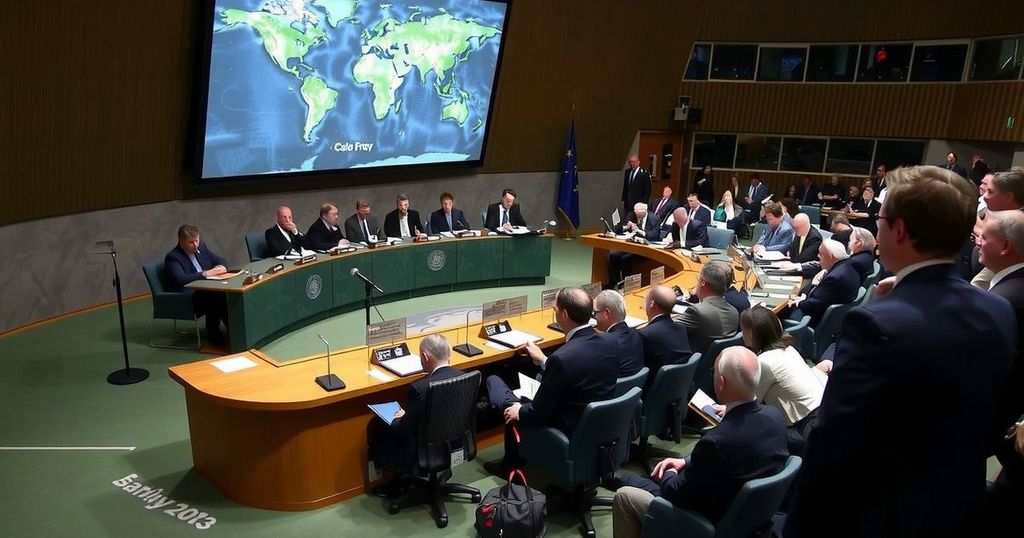World Leaders’ Absence Highlights Urgent Need for Climate Action at UN Talks

The UN climate conference in Baku saw the absence of key leaders from the largest carbon-emitting nations, highlighting a lack of political will. With a focus on climate finance for poorer nations, discussions continue amid concerns over the urgency of climate action. UN Secretary-General António Guterres emphasized the need for investment rather than charity in aiding these countries.
World leaders gathered on Tuesday for the United Nations annual climate conference in Baku, Azerbaijan, however, key figures from the world’s largest carbon-emitting countries were noticeably absent. This year’s climate talks bear resemblance to an understated chess championship, devoid of the typical star power usually found in such significant global summits. The absence of leaders from the 13 countries responsible for over 70% of carbon emissions in 2023 highlights a concerning lack of political urgency. Notably missing are heads of state from China, the United States, India, and Indonesia, collectively representing over 42% of the global population. Climate scientist Bill Hare, CEO of Climate Analytics, remarked on this absence, stating, “It’s symptomatic of the lack of political will to act. There’s no sense of urgency.” His sentiments resonate with the challenges posed by the alarming rise in global temperatures, as addressed by United Nations Secretary-General Antonio Guterres during his address to those present. Guterres pointed to a pressing need for action, mentioning the unprecedented heat events witnessed this year while emphasizing that the clean energy revolution is well underway. As Azerbaijan’s host President Ilham Aliyev initiated the summit’s proceedings, he used the opportunity to criticize both critics of his country’s oil and gas history and the Western media. He contended that blaming Azerbaijan as a “petrostate” is unjust, given its modest contribution to global oil production, and pointed out that it is essential to recognize the role of natural resources as a blessing. Despite the lack of high-profile attendees, representatives from various small island nations and several leaders from vulnerable African nations continue to play pivotal roles in discussions. Azerbaijan’s Prime Minister Aliyev, UK Prime Minister Keir Starmer, and Turkey’s President Recep Tayyip Erdogan are among the few notable leaders addressing the summit. Some logistical challenges have led to significant absences, as many prominent leaders must attend the G20 meetings in Brazil next week. The discussions are significantly focused on climate finance, which involves aiding impoverished nations in transitioning their economies to renewable sources while addressing the humanitarian impacts of climate change. Guterres stressed that financial assistance to developing nations should be viewed as an investment rather than charity, reinforcing the necessity of tangible outcomes from the conference. In conclusion, the lack of prominent political figures at this year’s climate talks underscores a troubling disinterest in climate action. Yet, there remains hope as the conference continues, with a focus on the crucial financial implications for climate transition and resilience in vulnerable nations.
The United Nations climate conferences are pivotal gatherings where nations collectively address the pressing issue of climate change. These summits not only facilitate negotiations on emission reductions but also highlight the importance of climate finance, particularly for developing countries. This year, the conference in Baku, COP29, has drawn attention for the absence of leaders from the world’s largest polluting nations, underscoring challenges in mobilizing political will and urgent action towards climate goals. The absence of high-profile figures raises questions about the commitment of major economies to global climate agreements, while discussions aim to secure substantial financial assistance to support vulnerable nations in their transition away from fossil fuels.
This year’s UN climate conference reveals a stark contrast to previous summits, characterized by the lack of major leaders from the world’s largest greenhouse gas emitters. Their absence symbolizes a troubling trend of disengagement from critical climate discussions at a time when urgent action is necessary. However, hopes remain that the ongoing negotiations will yield meaningful commitments toward climate finance to support vulnerable nations in addressing the urgent challenges posed by Global warming.
Original Source: www.voanews.com






